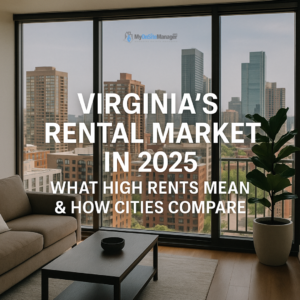Virginia now ranks among the more expensive states for renters, and averages for one-bedroom units are approaching levels where housing costs pose meaningful burdens for many households. For example: one report puts the average one-bedroom rent at around $1,792/month in Virginia.
What the Data is Showing in 2025
Here are some updated snapshots of the rental market in Virginia from various sources:
-
According to Apartments.com, the average rent in Virginia (Oct 2025) is about $1,777/month for a one-bedroom.
-
From ApartmentList: the overall average rent (all sizes) is around $1,750/month, with one-bedrooms averaging ~$1,627/month.
-
One broader metric: According to CoStar and reported via the Virginia REALTORS® association, the effective rent per unit in Virginia in 2025 is about $1,820/month, up 2.7 % from the 2024 average of $1,772.
-
On the high end: In high‐cost areas like Fairfax, Virginia (in Northern Virginia), the average rent across all bedrooms and property types is about $2,844/month.
-
On the more affordable side: In Virginia Beach, Virginia the average one-bedroom is around $1,544/month.
What this tells us:
-
Rental costs vary widely across the state (metro vs non-metro, Northern Virginia vs coastal vs inland).
-
Average rents are rising but not necessarily at explosive rates, in many places modest increases.
-
Affordability is becoming more strained, especially when wages don’t keep up with rent.
-
Some smaller markets remain relatively more affordable compared to the major metro areas.
City & Region Comparisons
Here’s a deeper look at how things break down in several Virginia localities:
Northern Virginia (e.g., Fairfax & the D.C. commuter belt)
-
In Fairfax the average rent across all unit types is ~$2,844/month.
-
This area is significantly above the state average, reflecting high demand, proximity to Washington D.C., and rising costs.
Virginia Beach
-
One-bedrooms ~ $1,544/month.
-
More affordable than many Northern Virginia locales, yet still higher than some parts of the country.
Richmond
-
One-bedroom averages around ~$1,404/month in October 2025.
-
Relative to the state and national averages, this is more moderate but rising.
-
NOTE: A recent report flagged that affordable apartments (renting under ~$1,000/month) are disappearing in Richmond, which is adding pressure.
Smaller markets & variation
-
In Fredericksburg, Virginia: one-bedroom averages ~$1,692/month.
-
In more rural or less-dense counties the fair market rent (FMR) for a 2-bedroom can be as low as ~$851/month in one part of the state.
Key takeaway: If you’re willing to live further from major metro areas, rents may be considerably lower but still not cheap by many standards.
What’s Driving the Trend
Several forces are at work:
-
Strong job markets in certain regions (especially around D.C., Northern Virginia) drive up demand. For renters moving for work, this increases competition.
-
Supply constraints: New housing construction often lags demand, especially affordable units.
-
Regional differences: Coastal, urban, or commuter‐belt areas cost more. Rural or less‐connected areas cost less but often come with trade-offs (commute, fewer amenities).
-
Wage vs rent gap: Rent is rising in many places faster than wages, making rentals less affordable. For example, in Richmond a report suggests you’d need ~$68K income to afford typical rent, while average incomes are lower.
-
Affordability squeeze: Units that are cheaper are disappearing in some markets (especially older or lower-cost housing stock).
-
National context: According to one projection, median rents nationally are expected to rise ~5% in 2025 for one-bedrooms.
Implications for Renters
What this means if you’re renting (or planning to) in Virginia:
-
Budget carefully: If rent is ~$1,600-$2,000 (or more in high‐cost areas), you’ll want to make sure your income covers that plus utilities, transportation, etc.
-
Location matters a lot: Choosing a suburb instead of a city, or a less-expensive region, can make a big difference in what you pay.
-
Expect trade-offs: If you choose lower rent, you might accept a longer commute, fewer amenities, or less central location.
-
Negotiate when possible: In some markets with more inventory, you may find better deals but less so in high‐demand zones.
-
Look to future trends: Watch for markets where supply is growing (which might moderate rent increases) or where demand is shifting (remote work, economic changes).
-
Consider total cost: Rent is just one piece utilities, commuting, parking, taxes may add significantly.
-
Think long term: If you’re renting for several years, ask: Will this rent continue rising? Is it sustainable for you?
Final Thoughts
Virginia is not uniformly “expensive” for renters but many parts of the state are seeing rental costs push into higher ranges. For renters in or moving to Virginia, being informed about which regions cost more (and why) is crucial. The difference between Northern Virginia, coastal Virginia, and inland or smaller markets can be large.
If you’re evaluating renting in Virginia, keep in mind:
-
What area you’re looking at (metro vs non-metro).
-
What size unit you need (studio vs one-bedroom vs two-bedroom).
-
What your income is relative to the rent and cost of living.
-
What your priorities are (location, commute time, amenities).
-
How the market may evolve (will rent rise again? is supply increasing?).
With that in mind, you’ll be in a better position to choose something within your budget and lifestyle.
Source: Virginia ranked 10th most expensive state to rent in U.S., 13News Now. Available at: https://www.13newsnow.com/article/news/local/virginia/virginia-10th-most-expensive-state-to-rent-us/291-a77badae-d13b-4d15-a266-e1223fea1128

